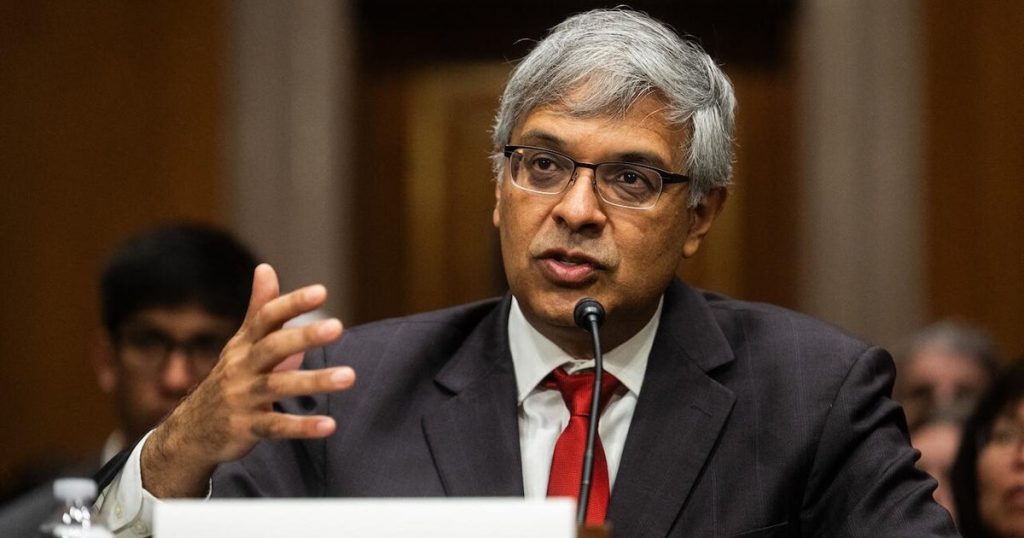The National Institutes of Health (NIH) is facing delays in the release of preliminary results from new studies on autism, originally anticipated by Health and Human Services Secretary Robert F. Kennedy Jr. this September. NIH Director Dr. Jay Bhattacharya has stated that it might take until next year to publish the initial findings. Although the situation has raised concerns, Bhattacharya emphasized the commitment to expedite the research process while maintaining scientific rigor.
| Article Subheadings |
|---|
| 1) NIH Aims for Transparency in Autism Studies |
| 2) Understanding the Funding and Grant Process |
| 3) Secretary Kennedy’s Perspective on Research |
| 4) Concerns from Advocacy Groups |
| 5) The Future of Autism Research at NIH |
NIH Aims for Transparency in Autism Studies
The NIH has committed to a transparent approach in its new autism studies. The agency’s leadership aims to ensure that research advances are communicated clearly and that any delays are publicly acknowledged. Director Dr. Jay Bhattacharya stated that although preliminary results may not be available until next year, the process is considered rapid by NIH’s standards. He highlighted the importance of cutting through bureaucratic delays without compromising on scientific rigor, illustrating the balancing act of ensuring thorough research while addressing public expectations.
Understanding the Funding and Grant Process
As part of the autism research initiative, the NIH plans to allocate significant funds through a rigorous grant application process. Each grant will be evaluated by a panel of peer reviewers, selected from the scientific community. Dr. Bhattacharya mentioned that the NIH is considering a budget in the “tens of millions of dollars” for the venture, intending to award grants to between 10 and 20 research groups. This strategic funding allocation is critical to advancing the scientific inquiry into autism, drawing on expertise from various institutions.
Secretary Kennedy’s Perspective on Research
Secretary Robert F. Kennedy Jr. has been vocal about the urgency for quick results in autism research. He initially pledged that preliminary findings would be available by September, a promise that has since been adjusted. Dr. Bhattacharya explained that Kennedy’s expectations reflect a genuine enthusiasm to push scientific initiatives forward rather than miscommunication. The director suggests that Kennedy’s involvement is intended to expedite the process rather than impose constraints, indicating a collaborative framework between political bodies and scientific research.
Concerns from Advocacy Groups
Despite the enthusiasm surrounding this new research initiative, advocacy groups have raised significant concerns about the focus on autism causation. Organizations like the Autistic Self Advocacy Network criticize the prioritization of research into causes of autism, emphasizing the need to direct funding towards support and services for individuals living with autism. These groups argue that the billions previously invested in similar studies have not yielded substantial new insights, and they advocate for a paradigm shift towards practical assistance for those impacted by autism.
The Future of Autism Research at NIH
Looking ahead, the NIH is poised to make substantive contributions to autism research through enhanced funding and systematic studies. With multi-institute collaboration, the NIH aims to explore different dimensions of autism, including genetic, environmental, and neurobiological factors. Bhattacharya reassured constituents that privacy concerns regarding the use of medical records are at the forefront of their strategy, pledging that individual identifiers would be removed from research data, allowing for anonymity and compliance with ethical standards. This focus on ethical practices may influence public perceptions and foster trust in the research process.
| No. | Key Points |
|---|---|
| 1 | NIH delays preliminary autism study results until next year. |
| 2 | Director Dr. Bhattacharya emphasizes transparency in research. |
| 3 | Funding in the “tens of millions” designated for multiple research groups. |
| 4 | Advocacy groups urge focus on services rather than causes of autism. |
| 5 | Ethical practices highlighted to protect patient privacy in research. |
Summary
The prevailing narrative surrounding the NIH’s autism research underscores the delicate intersection of public expectation and scientific reality. As the agency navigates the complexities of funding allocations, public communication, and stakeholder interests, the collaboration between political figures and scientific experts remains critical. These studies not only have the potential to yield new insights into autism but also reflect on broader societal responsibilities towards individuals and families affected by the condition.
Frequently Asked Questions
Question: What is the purpose of the NIH’s new autism studies?
The NIH aims to explore various factors contributing to autism, such as genetic, environmental, and neurobiological influences.
Question: How will the NIH ensure the privacy of participants in the autism research?
The NIH plans to remove identifiers from medical records, allowing researchers to work with aggregated data instead of individual patient information.
Question: What are advocacy groups saying about the NIH’s focus on autism research?
Advocacy groups, including the Autistic Self Advocacy Network, express concerns about prioritizing causes of autism over necessary support for individuals and families affected by it.


